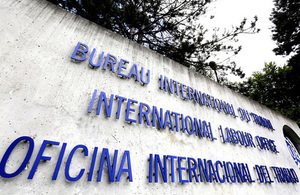ILO Governing Body: UK Statement on the ILO Centenary Initiatives
This UK statement was delivered during the ILO Report of the Director General First Supplementary Report: Follow-up to the Centenary Initiatives.

The ILO Governing Body meetings takes place at the ILO in Geneva.
The UK aligns itself with the statements of the EU and its Member States and IMEC.
The UK thanks the Director General for this latest report on the ILO Centenary Initiatives.
The outcomes of the Centenary Initiatives will be vital in equipping the ILO to set the direction of the work of the ILO for the next 100 years. The initiatives are, rightly, wide ranging and, if I may, I’d like to focus on a number of specific areas, while recognising that, of all the initiatives, the UK considers the Future of Work Centenary Initiative to be of the utmost importance.
All organisations, whether in the multilateral system, or the national private and public sectors, need to be efficient, transparent and consistent in order to be effective. The UK therefore welcomes the work that has been happening under the Governance and Standards Initiatives. Work is progressing to ensure that the structures and processes of the ILO are fit for purpose as we move into the Organisation’s second century. The UK is a strong supporter of the Standards Review Mechanism and took part in the initial meetings of the working group. The Standards Review Mechanism is an important means of identifying outdated standards, and it is also a means by which gaps in the existing standards can be identified.
The UK welcomes the aims and strategic components of the Enterprises Initiative and, in particular, those aspects associated with supply chains policies and practices. Global supply chains account for more than 450 million jobs worldwide and we must ensure that people in those jobs are adequately protected from exploitation. The UK was the first country in the world to require businesses to report on the steps they have taken to tackle modern slavery in their global supply chains, through the transparency provision in the Modern Slavery Act. We believe international action – from the private sector as well as governments and international organisations - is essential. Whilst businesses tell us that they are supportive of transparency, they stress the need to have reporting requirements that are consistent internationally. The UK therefore looks forward to hearing more from the Office on work to date and next steps on the Roadmap on global supply chains.
The UK continues to support the activities of the ILO under the End to Poverty Initiative and welcomes the significance this holds for the ILO’s contribution to the implementation of the UN 2030 Sustainable Development Agenda. In particular, we commend the ILO for its continued leadership concerning target 8.7, which aims to achieve a world without forced labour, modern slavery, human trafficking and child labour. The UK supports Alliance 8.7, a multi-stakeholder alliance aimed at accelerating the pace towards achieving target 8.7.
The UK also welcomes the Women at Work Initiative and commends the Office for its work on equal pay for work of equal value. We look forward to the ILO Global Wage Report 2018/19, which will focus on gender wage and earnings inequalities, as well as the 2019 report on the future of women at work.
Finally, Chair, as I mentioned before, the Future of Work Centenary Initiative is of the utmost importance for identifying ways and means for the ILO to take action regarding the challenges and opportunities of the changing world of work. The future of work as a topic has generated much debate and now is the time for us to move forward from debate to action. In 2017, the UK Government commissioned a review of modern working practices in the UK – the Taylor Review. The review explored a number of key issues including the balance of rights and responsibilities between individuals and businesses, opportunities for underrepresented groups, and new business models such as employment platforms. The UK Government is committed to firm action and future legislation to take forward the recommendations in the report. The UK is equally supportive of action at the international level and the ILO has an important role to play. We look forward to the publication of the report of the Global Commission on the Future of Work in January next year and welcome the fact that the Commission intends the report to have a strategic and action-oriented approach. The ILO must grasp the opportunity of its centenary year to agree actions on the future of work that place the ILO front and centre of work at the international level to deliver measurable results for hard-working people everywhere
The UK supports the decision point.
Thank you, Chair.